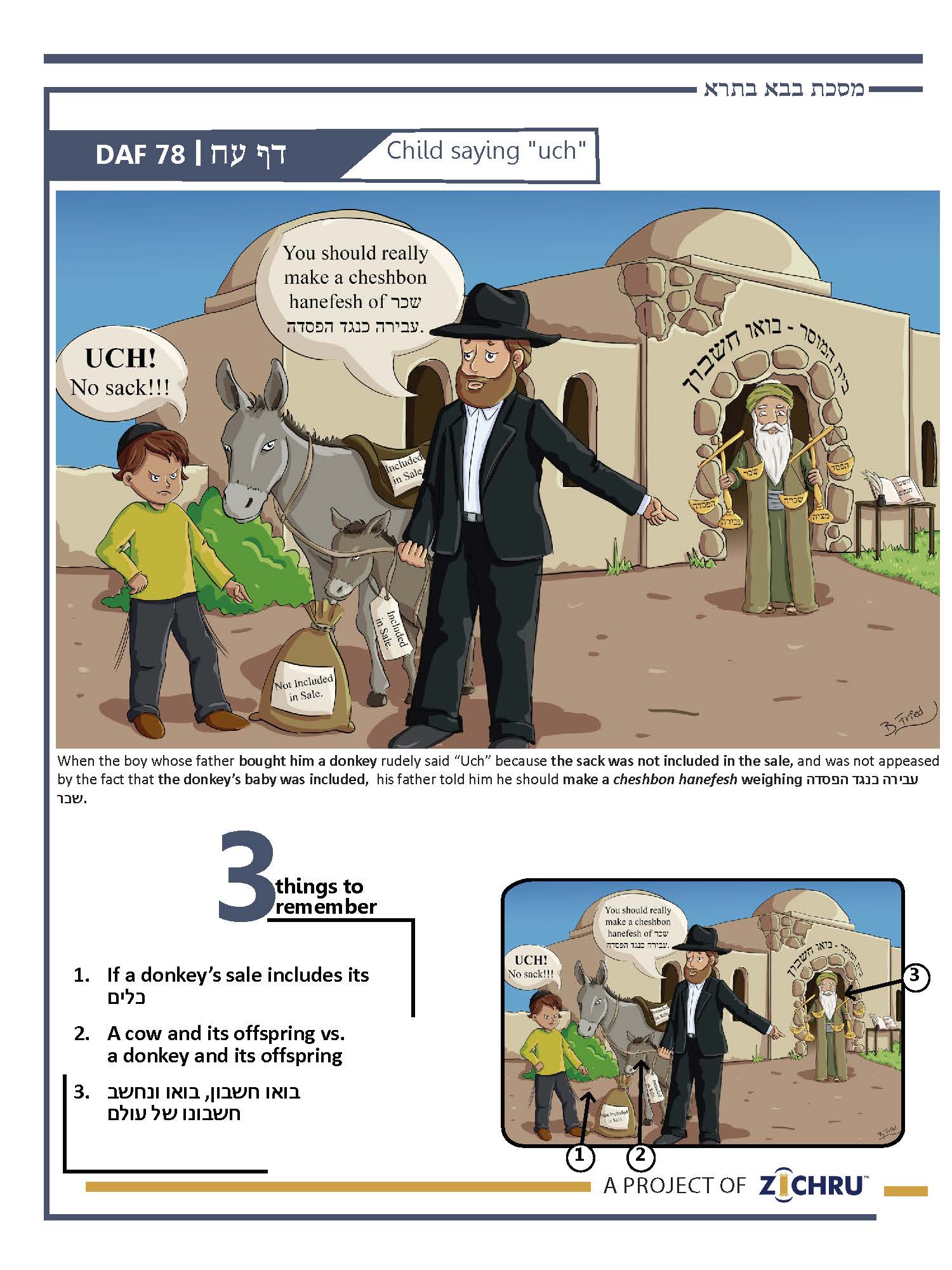Bava Basra - Daf 78
- Audio Timestamps
0:00 - The 3 Sugyos
3:18 - Review of 3 Sugyos
6:17 Siman
8:54 - 4 Blatt Back Chazarah
14:39 - Pop Quiz (Last 7 blatt)
For access to all Zichru resources including PDFs, and illustrations CLICK HERE
- If a donkey’s sale includes its כלים
The next Mishnah states: המוכר את החמור לא מכר כליו – one who sells a donkey did not automatically sell its gear. Nachum Hamadi said he did sell its gear. Rebbe Yehudah says that sometimes it is sold, and sometimes not: היה חמור לפניו וכליו עליו – if a donkey was before him, with its gear on it, and the buyer said, מכור לי חמורך זה – “Sell me this donkey of yours,” the gear is sold (“this” donkey means “as it is”). If he said, חמורך היא – “If it is your donkey, sell it to me,” the gear is not sold with it, as the Gemara will explain. Ulla says the machlokes Tannaim concerns the donkey’s sack, saddlebag, and sidesaddle (used by women riders), which are accessories for the donkey’s burden (since women sit on the side and are carried like other cargo). The Tanna Kamma holds: סתם חמור לרכוב קאי – an ordinary donkey is used for riding, so cargo accessories are not included in the sale, and Nachum Hamadi holds: סתם חמור למשאוי קאי – an ordinary donkey is used for bearing a burden, so such gear is included. But all agree that the saddle, blanket, and other accessories used for both riding and cargo are included.
- A cow and its offspring vs. a donkey and its offspring
The next Mishnah states: המוכר את החמור מכר את הסיח – One who sells a donkey automatically sold its offspring, מכר את הפרה לא מכר את בנה – but one who sells a cow did not automatically sell its offspring. The Gemara asks that if he said, “I am selling you it and its offspring,” the child would be sold in both cases, and if he did not mention the child, it should not be sold in either case!? Rav Pappa explains that the case is where he said: חמור מניקה ופרה מניקה אני מוכר לך – “I am selling you a nursing cow,” or “a nursing donkey.” Therefore, regarding a cow, איכא למימר לחלבה בעי לה – it is possible that he needs it for its milk, so specifying a “nursing” cow does not necessarily indicate a request for the calf. But regarding a donkey, whose milk is forbidden to consume, why would he specify a “nursing” donkey? This proves he meant to purchase its offspring as well.
- בואו חשבון, בואו ונחשב חשבונו של עולם
Rebbe Yochanan darshened a series of pesukim beginning with "על כן יאמרו המושלים" – regarding this the poets would say, אלו המושלים ביצרם – these are those who rule over their desires, "בואו חשבון" – “Come to Cheshbon” means: בואו ונחשב חשבונו של עולם – come, let us make an accounting of this world, הפסד מצוה כנגד שכרה – weighing a mitzvah’s loss (i.e., cost) against its gain (i.e., reward), ושכר עבירה כנגד הפסדה – and a sin’s gain against its loss. "תבנה ותכונן" – “Let it be built and established” teaches that if you do so, תבנה בעולם הזה – you will be built up in this world, ותכונן לעולם הבא – and established in the World to Come. "עיר סיחון" – “The city of Sichon” teaches: אם משים אדם עצמו כעיר זה – if a person makes himself like this [donkey] foal, שמהלך אחר סיחה נאה – which follows gentle talk (the basis of the word "סיח" for foal, as explained above), then the passuk says: "כי אש יצאה מחשבון וגו'" – for a fire has come out from Cheshbon, etc., teaching: תצא אש ממחשבין – let a fire come out from those who make an accounting, ותאכל את שאינן מחשבין – and consume those who do not make an accounting.
The derashos continue onto the next Daf.
Siman – A child going “Uch”
When the boy whose father bought him a nursing donkey rudely said “Uch” because the sack was not included in the sale and was not appeased by the fact that the donkey’s baby was included, his father told him he should make a cheshbon hanefesh weighing שכר עבירה כנגד הפסדה.


